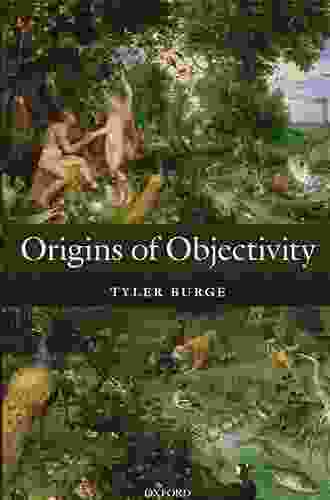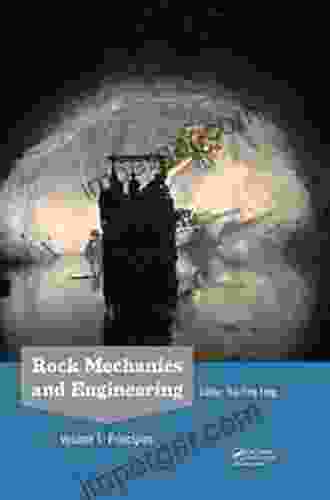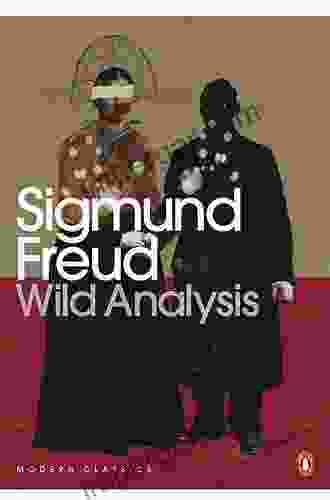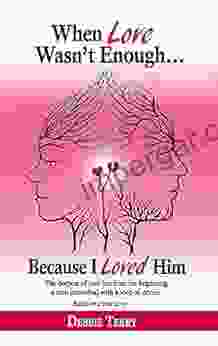Origins of Objectivity: A Philosophical Journey into the Nature of Knowledge and Reality

4.5 out of 5
| Language | : | English |
| File size | : | 2669 KB |
| Text-to-Speech | : | Enabled |
| Screen Reader | : | Supported |
| Enhanced typesetting | : | Enabled |
| Print length | : | 645 pages |
| Lending | : | Enabled |
: The Enigma of Objectivity
The concept of objectivity has long captivated the minds of philosophers, scientists, and scholars alike. What is it that makes certain truths objective, independent of our subjective experiences and beliefs? How do we distinguish between objective knowledge and mere opinion? Tyler Burge's groundbreaking work, 'Origins of Objectivity', delves into these fundamental questions, offering a novel and thought-provoking exploration of the nature and origins of objectivity.
Burge's Theory of Individualism
At the heart of Burge's theory lies the notion of individualism, which posits that objectivity arises from the convergence of individual perspectives. According to Burge, objectivity is not an inherent property of the world but rather a product of our collective cognitive abilities. When individuals with different experiences, backgrounds, and beliefs come to agreement on a particular matter, it is because they share a common set of cognitive mechanisms that enable them to converge on the same truth.
This convergence, Burge argues, is not a mere coincidence but rather a result of our evolved cognitive architecture. Our brains have developed mechanisms that allow us to process information from our environment, make inferences, and communicate our thoughts and beliefs with others. These mechanisms, which Burge refers to as 'individually necessary' and 'individually sufficient' conditions, provide the foundation for the possibility of objective knowledge.
The Role of Language and Social Interaction
Burge emphasizes the crucial role of language and social interaction in the development of objectivity. Language provides us with a medium through which we can express our thoughts, share ideas, and negotiate meanings. Social interaction, in turn, allows us to test our beliefs against the beliefs of others, refine our understanding, and converge on a common ground of knowledge.
Burge argues that our ability to engage in rational discourse and debate is essential for the development of objective knowledge. Through the exchange of ideas and arguments, we can identify flaws in our own reasoning, challenge the assumptions of others, and ultimately reach a consensus on the truth.
Objectivity and the External World
While Burge's theory of individualism places emphasis on the role of individual cognition, it does not deny the existence of an external world independent of our minds. Burge acknowledges that there is a reality external to our subjective experiences, but he argues that our knowledge of this reality is mediated through our cognitive mechanisms.
In other words, our understanding of the world is shaped by our sensory experiences, our cognitive abilities, and the language and social conventions we use to describe and interpret our experiences. Objectivity, in this sense, is not a direct reflection of the external world but rather a product of our cognitive engagement with it.
Applications and Implications
Burge's theory of objectivity has far-reaching implications for various fields of inquiry, including epistemology, metaphysics, philosophy of mind, philosophy of language, and philosophy of science.
In epistemology, Burge's theory provides a novel framework for understanding the nature of knowledge and its relationship to objectivity. His emphasis on the role of individual cognition and social interaction challenges traditional notions of knowledge as a purely objective or purely subjective phenomenon.
In metaphysics, Burge's theory offers insights into the relationship between the mind and the world. His work suggests that our understanding of reality is not a passive reflection of the external world but rather an active construction shaped by our cognitive abilities.
In philosophy of mind, Burge's theory sheds light on the nature of consciousness and its relationship to objectivity. His work suggests that consciousness is not a purely subjective phenomenon but rather a product of our cognitive engagement with the world.
In philosophy of language, Burge's theory explores the role of language in the development and transmission of knowledge. His work highlights the importance of language as a tool for communication, negotiation, and the pursuit of objective truth.
In philosophy of science, Burge's theory provides a new perspective on the nature of scientific knowledge. His work suggests that scientific objectivity is not a static or absolute concept but rather a dynamic and evolving process shaped by the collective cognitive efforts of the scientific community.
: A Transformative Exploration of Objectivity
Tyler Burge's 'Origins of Objectivity' is a groundbreaking work that offers a profound and thought-provoking exploration of the nature of objectivity. Burge's theory of individualism, which emphasizes the role of individual cognition and social interaction, provides a novel framework for understanding how we can achieve objective knowledge and navigate the complex relationship between our minds and the external world.
This comprehensive article has provided an overview of some of the key ideas and implications of Burge's work. For a more in-depth exploration, readers are encouraged to engage with the original text, which is a rich and rewarding source of philosophical insights.
4.5 out of 5
| Language | : | English |
| File size | : | 2669 KB |
| Text-to-Speech | : | Enabled |
| Screen Reader | : | Supported |
| Enhanced typesetting | : | Enabled |
| Print length | : | 645 pages |
| Lending | : | Enabled |
Do you want to contribute by writing guest posts on this blog?
Please contact us and send us a resume of previous articles that you have written.
 Book
Book Novel
Novel Page
Page Chapter
Chapter Text
Text Story
Story Genre
Genre Reader
Reader Library
Library Paperback
Paperback E-book
E-book Magazine
Magazine Newspaper
Newspaper Paragraph
Paragraph Sentence
Sentence Bookmark
Bookmark Shelf
Shelf Glossary
Glossary Bibliography
Bibliography Foreword
Foreword Preface
Preface Synopsis
Synopsis Annotation
Annotation Footnote
Footnote Manuscript
Manuscript Scroll
Scroll Codex
Codex Tome
Tome Bestseller
Bestseller Classics
Classics Library card
Library card Narrative
Narrative Biography
Biography Autobiography
Autobiography Memoir
Memoir Reference
Reference Encyclopedia
Encyclopedia Emily Rose
Emily Rose Theresa Marcroft
Theresa Marcroft Touri Language Learning
Touri Language Learning Jessica Ortner
Jessica Ortner Travis Langley
Travis Langley Yvonne D Sims
Yvonne D Sims Clare Flynn
Clare Flynn Viktor Rydberg
Viktor Rydberg Steven Jones
Steven Jones Stacey Hersh
Stacey Hersh Stephen P Reyna
Stephen P Reyna Mackenzie Moulton
Mackenzie Moulton Stephen M Bainbridge
Stephen M Bainbridge William J Bly
William J Bly Wilkie Collins
Wilkie Collins Dr Steven Armadi
Dr Steven Armadi Shwetambri Sharma
Shwetambri Sharma Thomas A Guglielmo
Thomas A Guglielmo Victoria Lemle Beckner
Victoria Lemle Beckner Martin H Johnson
Martin H Johnson
Light bulbAdvertise smarter! Our strategic ad space ensures maximum exposure. Reserve your spot today!

 Benjamin StoneUnveiling the Wonders of Organophosphorus Chemistry: A Journey with Wallace...
Benjamin StoneUnveiling the Wonders of Organophosphorus Chemistry: A Journey with Wallace...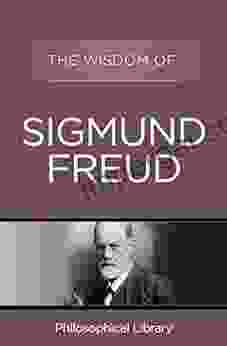
 Dalton FosterUnveiling the Profound Wisdom of Sigmund Freud: A Journey into the Depths of...
Dalton FosterUnveiling the Profound Wisdom of Sigmund Freud: A Journey into the Depths of... William PowellFollow ·17.5k
William PowellFollow ·17.5k Bob CooperFollow ·7.7k
Bob CooperFollow ·7.7k Alexander BlairFollow ·5k
Alexander BlairFollow ·5k Ruben CoxFollow ·17.1k
Ruben CoxFollow ·17.1k Bernard PowellFollow ·15.2k
Bernard PowellFollow ·15.2k Jared PowellFollow ·10.5k
Jared PowellFollow ·10.5k James HayesFollow ·11.6k
James HayesFollow ·11.6k Jack PowellFollow ·18.2k
Jack PowellFollow ·18.2k

 Everett Bell
Everett Bell12 Horrific American Serial Killers: A Spine-Chilling...
Immerse yourself in the darkest recesses of...

 Ross Nelson
Ross NelsonDiscover the Enchanting World of "All That Love...
Prepare to embark on an...

 Cooper Bell
Cooper BellUnveiling the Secrets of Shoulder-Launched Munitions: The...
: Unlocking the World of Shoulder-Launched...
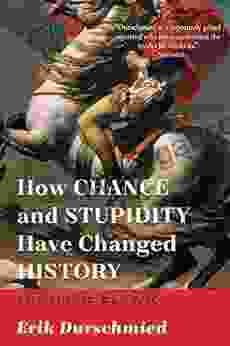
 Boris Pasternak
Boris PasternakHow Chance and Stupidity Have Changed History: A...
Prepare yourself for...
4.5 out of 5
| Language | : | English |
| File size | : | 2669 KB |
| Text-to-Speech | : | Enabled |
| Screen Reader | : | Supported |
| Enhanced typesetting | : | Enabled |
| Print length | : | 645 pages |
| Lending | : | Enabled |


